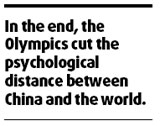Olympic legacy to impact future

The final curtain has rung down. The Games are over. But the economic, social, and cultural impacts of the Olympics will reverberate - in China and the world - for years to come.
To begin with, China's unstoppable rise - powered by its socialist market economy - was underscored by the march of its athletes to the gold medal table.
Bagging the most gold medals by any nation, China simultaneously showed its magnanimity and friendliness to the world in the good sportsmanship, and support it showed for the many winners, and guests from other nations.
Economically, as pointed out by Chinese economist Han Baojiang, the Olympics served as a platform to showcase China's economic potential to the world. China's profile as a rapidly emerging global economic power was indelibly etched on the mind by the ultra-modern Bird's Nest stadium, by the breathtaking use of hi-tech, some of it homegrown, in the opening and closing ceremonies, and by the sheer gigantic scale of the stadium and the events.
Watched in person and on TV by billions around the world, these sights seen at the Olympics are bound to augment the already pronounced trend for foreign companies, capital, and people to "come to China".
No longer can China be perceived as just the "workshop of the world". No longer can it be seen as just "a maker of toys, cheap electronics, and the like". The Olympics - and the window it provided into modern China - underscored China's role as now a major player in the worlds of innovation, science, high-tech, and global enterprise.
Chinese economist Han Baojiang has also pointed out in a recent interview that the "window on China" afforded by the Olympics will help to dispel lingering concerns about the quality of Chinese products.
Widely-reported - and sometimes exaggerated - stories in 2007 on defective Chinese-made toys, spoiled food products, and the like aroused understandable concerns outside the country. The Chinese government acted quickly at that time to enhance supervision and quality-control procedures to prevent recurrences. Still, the near-flawless management and presentation of the Olympics will help to counter any remaining concerns about Chinese production quality.
Socially, the positive image conveyed by the Olympics will almost certainly contribute to accelerating the trend for non-Chinese people to live and work in China for long periods, or even for a lifetime.
As a then resident of Vancouver, Canada, I well remember that the holding of the World Exposition in Vancouver in 1986 resulted in subsequent large migrations of people from around the world, and especially from Asia, to live in Vancouver. So many people moved there from Hong Kong, for example, that some people began referring to the city humorously as "Hongcouver".

Similarly, the Beijing Olympics will almost certainly stimulate some of the Olympic visitors, their friends or associates, or even TV viewers of the Olympics to consider moving to live and work in China.
The presence of non-Chinese in larger numbers will, in turn, hasten China's economic, social, and cultural connectivity with the world, and engender a more multi-cultural/multi-national culture at home in China itself.
Finally, the Olympics showcased to the world several important cultural themes. First, there was the impressive march around the stadium during the opening ceremony by the athletes of the participating nations.
With each group carrying its own flag - and a rainbow of races passing before us - we saw clearly and concretely just how diverse and colorful our world is.
In a media sphere frequently dominated by information about a few powerful nations, it was a strong reminder of both the globalization of culture and the importance of respect for the diversity of the world's peoples.
Olympic events also highlighted important aspects of China's own contemporary culture. The "Galas" in the opening and closing ceremonies integrated song, dance, and athletic acrobatics. The musical presentations shifted with almost blinding speed between Chinese pop, ethnic music of China's 56 ethnic groups, and classical Chinese music.
Such rapid oscillations between genres brought vividly to life the dynamic, multi-layered contemporary Chinese cultural scene, with its blend of the old, the new, the folk, and the futuristic.
During the seven years that went into its preparation, the Beijing Olympics have been a major theme of the Chinese government; an important area for Chinese economic activity and construction; and a lively topic of social conversation throughout China. That period is over.
But the Olympic showcasing of China - of its unstoppable rise driven by the socialist market economy, of its current transition from "low-cost producer" to "innovation society", of its ever-growing interconnection with the world, of its dynamic multi-faceted culture blending past and future - will continue to impact, and contribute, to China's development as part of an ever-more integrated world.
In the end, the Olympics cut the psychological distance between China and the world. "Remember our smile," said one of the hosts.
The author is a Canadian teacher living in Beijing
(China Daily 09/10/2008 page9)














